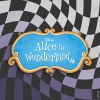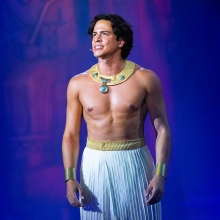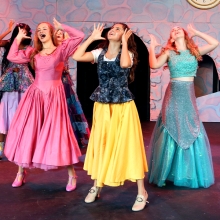On Wednesday, November 27th, the MTI office will close early at 1 PM ET for the Thanksgiving holiday weekend. Office operations will resume on Monday, December 2nd.
Thoroughly Modern Millie: Podcast on Character Portrayal

Thoroughly Modern Millie: Podcast on Character Portrayal
MTI is proud to present a podcast featuring a panel discussion focused on issues of race, stereotypes and identity politics in the musical, Thoroughly Modern Millie.
MTI hosted a panel discussion in January of 2016 moderated by NYU professor Jack Tchen which included two of the musical’s authors - lyricist and co-bookwriter Dick Scanlan and composer Jeanine Tesori. Also joining the discussion were Ken Leung and Francis Jue, the actors who originated the roles of Ching Ho and Bun Foo on Broadway.
The conversation offers unique perspectives from those intimately involved in the creation of the musical in order to provide a basis for constructive discussions on these sensitive topics within the community.
- To the Producer and Director of Thoroughly Modern Millie
-
As you may know, there have been a small number of schools that have expressed concern that as presented in the Millie script, Mrs. Meers, Bun Foo and Ching Ho may be construed as offensive to the Chinese community. In order to address this question, MTI hosted a panel discussion in January of 2016, moderated by NYU professor Jack Tchen which included two of the musical’s authors - lyricist and co-book writer Dick Scanlan and composer Jeanine Tesori. Also joining the discussion wereKen Leung and Francis Jue, the actors who originated the roles of Ching Ho and Bun Foo on Broadway.
The conversation offers unique perspectives from those intimately involved in the creation of the musical in order to provide a basis for constructive discussions on these sensitive topics within the community.
You can stream, download or read a transcript of the entire podcast below.
Additionally, in response to requests for an alternative author-approved approach to these roles, Dick Scanlan wrote the following letter:
- A Letter from Dick Scanlan
-
The character of Mrs. Meers -- a failed actor-turned-criminal-- is intended to behave in a manner consistent with an ignorant person's idea of how a Chinese woman would behave (i.e., her portrayal of a Chinese woman is based on her own stereotyping).
On the other hand, there are two genuine Chinese characters in the show-- Bun Foo and Ching Ho-- and other than the fact that they speak in their native tongue (i.e., Chinese dialects) they are no different than any of the other characters in the show--human, earnest and multi-dimensional.
Specifically, I want to clarify that from the authors’ perspective, there is only one stereotype: Mrs. Meers. She is a Caucasian woman using her “acting skills” to impersonate a Chinese woman in an effort to avoid police detection, and does it in a highly offensive way. If you feel you must stay away from that approach, in terms of narrative, all that is required is that Mrs. Meers be a failed actor who is using acting techniques to shield criminal activity. It does not have to be a “Chinese” act she’s doing.
The easiest and boldest way to solve this: cast a boy as “Mrs. Meers.” When he’s “Mrs. Meers,” he’s wearing a wig and fully trying to pass as a woman; when he’s alone with Bun Foo and Ching Ho, the wig comes off and he’s “David Crumpler,” failed actor-turned-criminal. There need be nothing Chinese about his disguise; he can disguise himself as any woman he wishes. Stereotype problem solved; story still told.
You may also, of course, cast an actress, and direct her to differentiate between “Mrs. Meers” and “Daisy Crumpler,” e.g. “Mrs. Meers” is a flighty, fluttery, aging Southern belle, and “Daisy Crumpler” is a tough-as-nails, Brooklyn born-and-raised villain, or some such contrast. Again, this avoids any reference to anything Chinese in regards to this character’s arc.
As for Bun Foo and Ching Ho, they are not stereotypes, they are people. Characters. That is why they speak and sing in Cantonese and Mandarin, respectively. I think the script states clearly -- and if it doesn’t, I’m stating it clearly here -- that in no way are their performances to be exaggerated, -2- lampooned, made fun of, nada. The actors should approach their roles no differently than the actress playing Millie approaches hers: with truth, integrity, imagination and intentionality. The Chinese should be rendered as authentically as possible. (The audio guide is conducted by an actor born and raised in China until he was 15; if that’s not enough guidance, hire a Chinese coach.) They should not be in “coolie” costumes. When they speak in English, e.g. “I love you, Miss Dorothy,” l’s do not become r’s; listen to the cast recording for confirmation of that. They don’t speak English, but they shouldn’t speak English: they’ve been in America for a few weeks. Make them as dimensional and differentiated from each other (they are as different from each other as Millie and Miss Dorothy are), and not only will you NOT be presenting stereotypes, you will be BUSTING stereotypes. I know this for a fact because I’ve seen it happen on Broadway, on Tour, in London, and in many, many productions I’ve seen since then.
I hope this letter provides you with the flexibility you might need in producing MILLIE. Thank you, and best of luck with your production.
Warm regards,
Dick Scanlan
Download the Podcast Here
Read the Transcript
Selected Highlights
1. From Screen to Stage
Author Dick Scanlan discusses the history of the musical version of Thoroughly Modern Millie.
2. Racism and Steroetypes
Actor Francis Jue discusses the racial stereotypes in the film version of Thoroughly Modern Millie and how the stage version seeks to subvert and remove them.
3. Reading vs. Seeing
Actor Francis Jue examines the difference between reading the script of the stage version of Thoroughly Modern Millie and seeing a production in reference to stereotypes.
4. How to Perform Millie in Your School
Actor Francis Jue offers insight into performing Thoroughly Modern Millie in schools and how to navigate the Asian characters.
5. Issues of Representation
Moderator Jack Tchen and actor Francis Jue discuss the evolving issues of representation on stage.
6. Rehearsing the Show
Author Dick Scanlan talks about rehearsal techniques to ensure you are correctly portraying the asian characters in your production of Thoroughly Modern Millie.

























